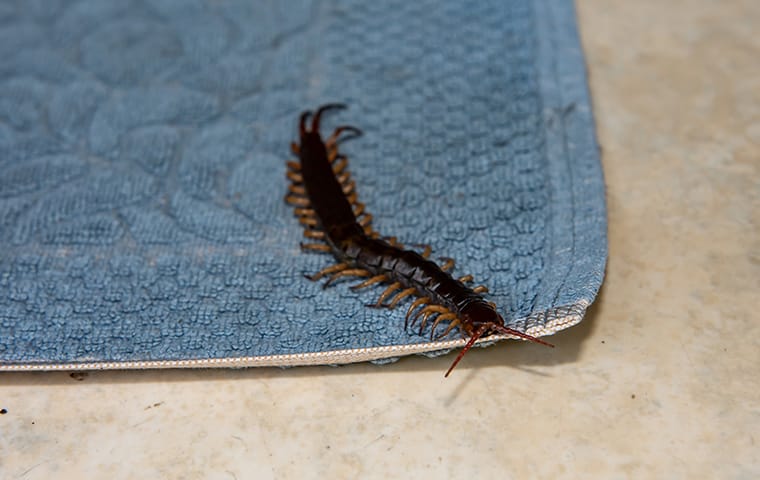What are centipedes & millipedes?
Centipedes and millipedes are both types of nuisance pests that are often described as occasional invaders. Occasional invaders are so called because these pests live most of their lives outdoors, but will move inside occasionally in order to escape unsuitable weather conditions outdoors.

Centipedes
Centipedes have long, flat, segmented bodies that are yellowish-gray to dark brown in color; each body segment has one pair of legs. Centipedes also have long, sensitive antennae. Additionally, depending on the species, they may have dark stripes or other markings on their bodies and anywhere between 15 and 177 pairs of legs. Their first pairs of limbs, called maxillipeds, end in sharp claws and contain venom glands that they use to catch and paralyze their prey.
Millipedes
Millipedes have worm-like bodies that are usually brown or black, and some species may also have red or orange mottled patterns. They have between 30 and 90 legs, depending on their species, and two pairs of legs per body segment. Millipedes are scavengers, feeding on decaying organic matter, and move more slowly than centipedes.
Are centipedes & millipedes dangerous?
Neither centipedes nor millipedes are particularly dangerous, but you should take care around them and never try to handle them. Millipedes spray a toxic, foul-smelling fluid as a means of defense, which will cause a skin reaction in some people. Centipedes bite to defend themselves, but – although painful – the venom injected is not strong enough to cause serious problems for people.
Why do I have a centipede & millipede problem?
These occasional invaders spend most of their time outside. Because of their high moisture needs, however, they will move indoors if the weather outside becomes too hot or dry. Centipedes and millipedes nest in areas near homes and businesses, and will find their way inside through cracks and crevices in the foundation or under basement doors.
Where will I find centipedes & millipedes?
Both centipedes and millipedes prefer to live outside in dark, damp habitats. You'll find these pests under landscaping ties, leaves, rotting logs, and rocks. They are also regularly found under trash cans and compost bins, where millipedes will burrow into the soil. Basements, crawl spaces, and areas underneath sinks are also common hiding spots.
How do I get rid of centipedes & millipedes?
For home and business owners who want to eliminate centipedes and millipedes from their property, partnering with a professional is the best way to be successful. Here at Jury Pest Services, we provide exceptional pest solving strategies that will eliminate these pests and prevent their return. Our green pest control solutions protect the environment, while still being effective against our area’s toughest pests. Serving Richmond County in Georgia and Aiken County in South Carolina, Jury Pest Services is committed to our customers and to providing trustworthy pest control services. We also provide our professional services to homes and businesses in Columbia County, GA, Edgefield County, SC, Barnwell County, SC, and beyond. To learn more about our pest control services, contact Jury Pest Services today!
How can I prevent centipedes & millipedes in the future?
In addition to the professional solutions you can find at Jury Pest Services, use the following tips to help prevent problems with centipedes and millipedes:
-
Remove piles of leaves, fallen trees or tree limbs, excess woodpiles, and other organic debris from your property.
-
Install door sweeps on exterior doors, especially basement doors.
-
Seal up cracks in the foundation of your property.
-
Place garbage cans and compost bins up off of the ground.
-
Create a barrier of crushed rock or stone between your property and any mulch, soil, or grass.
-
Use a dehumidifier in the basement, make sure crawlspaces are adequately ventilated, and fix leaky pipes to reduce moisture levels.
Schedule An Inspection Today!
Complete the form below to request an inspection.
 Reviews
Reviews